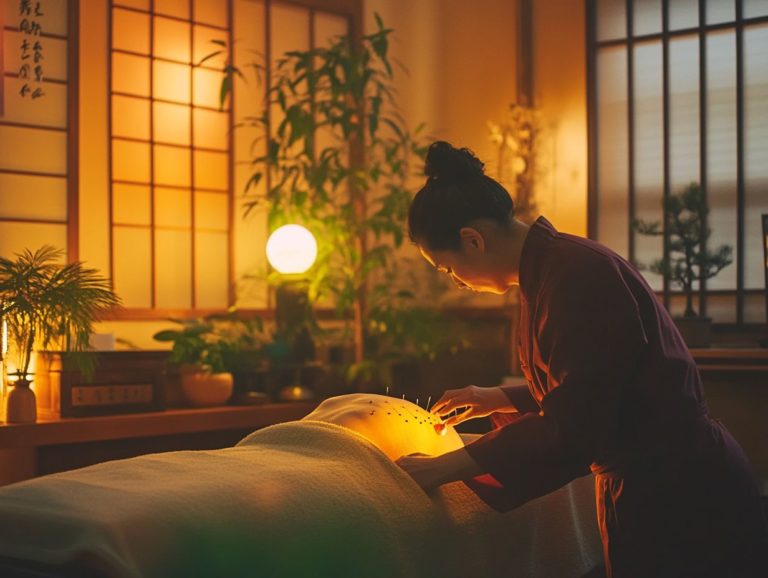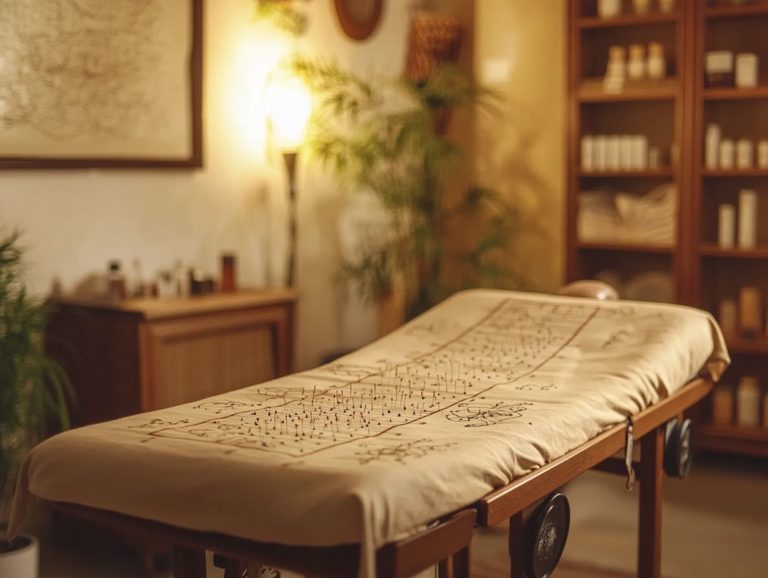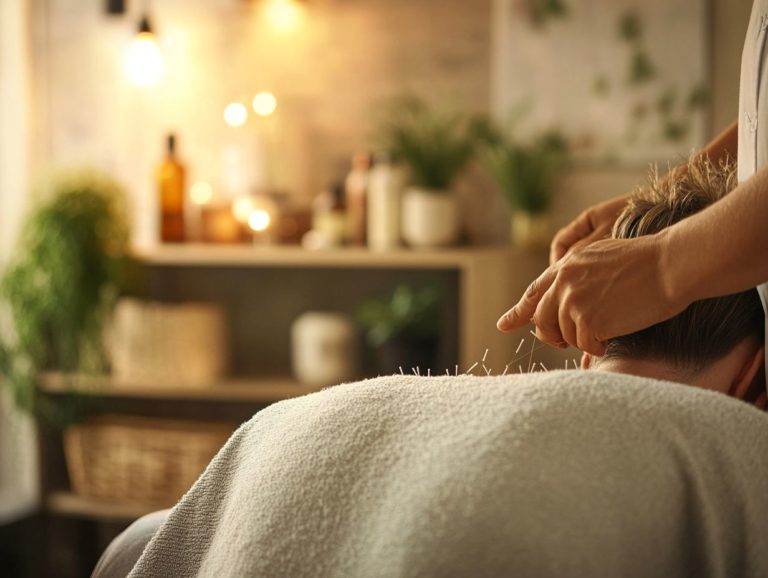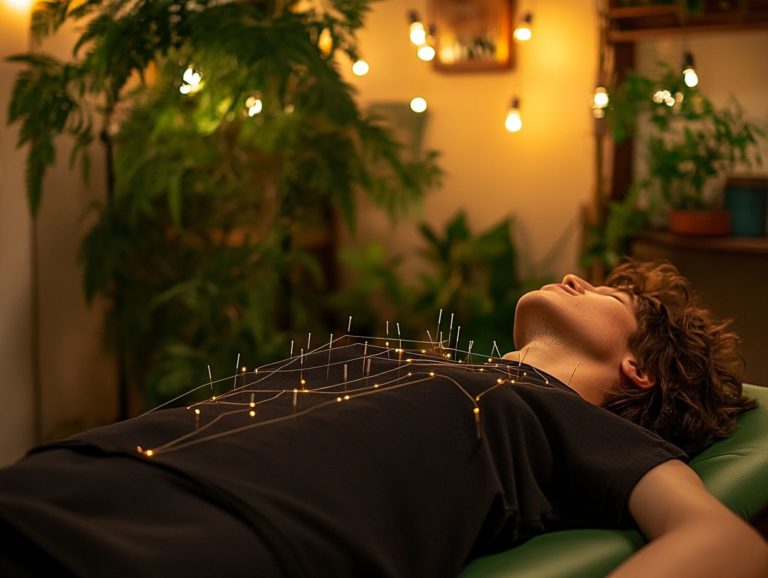How Acupuncture Can Benefit Your Overall Health
Acupuncture is an age-old practice steeped in Traditional Chinese Medicine. It provides much more than mere pain relief.
With its profound history and distinctive principles, acupuncture tackles a wide array of health conditions, encompassing both physical and mental aspects. This article delves into the myriad benefits of acupuncture, explains how it operates, outlines what you can expect during a session, and shares valuable tips for selecting the right acupuncturist.
Explore how this holistic approach can elevate your overall well-being and contribute to a healthier lifestyle.
Contents
- Key Takeaways:
- Understanding Acupuncture
- Conditions Treated by Acupuncture
- Benefits of Acupuncture
- Physical and Mental Benefits
- How Acupuncture Works
- Explanation of Traditional Chinese Medicine
- What to Expect During an Acupuncture Session
- The Process and Sensations
- Finding a Qualified Acupuncturist
- Frequently Asked Questions
Key Takeaways:

- Experience both physical and mental benefits.
- Treat common health issues like chronic pain and anxiety effectively.
- Research acupuncturists credentials before booking an appointment.
Understanding Acupuncture
Understanding acupuncture invites you to delve into its rich roots in traditional Chinese medicine. This ancient practice encompasses a variety of techniques designed to restore the balance of vital energy, known as qi, within your body.
By inserting fine needles at specific points along energy pathways in your body, acupuncture is thought to facilitate healing, alleviate pain, manage stress, and enhance overall well-being.
Recently, acupuncture has gained recognition as an effective approach to addressing a range of health concerns. It promotes the release of endorphins and boosts the immune system, helping with issues like mental health problems, insomnia, and neurological conditions.
History and Principles
The history of acupuncture stretches back over two millennia. It is deeply rooted in the principles of traditional Chinese medicine (TCM), which emphasizes the delicate balance of your body s vital energy.
Originating in China, this ancient practice has evolved over the centuries, intertwining with various cultural and philosophical developments. Early texts, such as the Huangdi Neijing, emphasized that health reflects harmony between your body s internal systems and the external environment.
These foundational principles continue to guide practitioners today, reinforcing a holistic approach to wellness. By understanding how energy flows through pathways and impacts bodily functions, modern acupuncture addresses physical ailments and nurtures emotional well-being.
Conditions Treated by Acupuncture
Acupuncture is a powerful tool that can transform your health. It stands out for its remarkable ability to address a wide range of conditions, especially in pain management and stress reduction.
This ancient practice offers a unique pathway to enhanced well-being within a holistic health approach.
Common Health Issues Addressed
Common health issues that acupuncture addresses include pain, stress, anxiety, insomnia, headaches, and migraines. This showcases its remarkable healing potential.
This holistic approach doesn t just focus on physical discomfort; it also embraces mental and emotional well-being. In terms of pain management, acupuncture releases endorphins, providing a natural pain-relieving effect that many find surprisingly effective.
If you re grappling with stress and anxiety, acupuncture helps achieve a state of relaxation by balancing cortisol levels and boosting your overall mood. For those battling insomnia, it promotes deeper, more restorative sleep cycles, enhancing your nightly rest.
Individuals suffering from persistent headaches and migraines may experience significant relief as acupuncture targets underlying issues. Ultimately, it can help reduce the frequency and intensity of these episodes, leaving you feeling revitalized and more in control of your health.
Benefits of Acupuncture

The advantages of acupuncture go far beyond mere pain relief, including significant enhancements to immune health as well as improvements to both physical and mental well-being.
This makes acupuncture a formidable ally in a holistic approach to well-being, and you can learn more about how to incorporate acupuncture into your wellness plan. It offers a comprehensive path to improved health and vitality.
Consider trying acupuncture for your health and experience its transformative effects!
Physical and Mental Benefits
Acupuncture offers a wealth of benefits for physical and mental health, including effective pain management and significant stress reduction. Exploring how acupuncture can enhance your wellness journey can provide even more insights into its advantages.
This ancient practice works wonders by alleviating chronic pain through targeted stimulation of specific points on the body, promoting increased blood flow and recovery. But it doesn t stop there; acupuncture enhances mental wellness.
By encouraging the release of endorphins, it lifts your mood and provides a natural defense against anxiety and depression. Regular sessions can also boost your immune function, fortifying your body s resilience against illness.
By tackling both physical discomfort and emotional turmoil, acupuncture presents a holistic approach to achieving balance and harmony in your overall health, as outlined in how acupuncture supports overall wellbeing.
How Acupuncture Works
Understanding how acupuncture works brings you into the realm of traditional Chinese medicine, which holds that the flow of life energy through specific pathways within the body significantly influences your overall health and vitality.
Explanation of Traditional Chinese Medicine
Traditional Chinese medicine (TCM) offers you a holistic approach to health that centers on achieving balance in life energy. By utilizing acupuncture and various other techniques, it ensures that energy flows freely through your body’s energy pathways.
TCM believes that balanced energy leads to better health. As you delve into the concept of life energy, practitioners will assess how this vital life force circulates and impacts both your physical and emotional health.
Acupuncture, a cornerstone of TCM, plays a vital role in activating specific points along these energy pathways, effectively alleviating blockages and restoring your equilibrium.
Through this integrative methodology, you receive personalized care tailored to foster your resilience and promote long-term vitality. This approach beautifully embodies the principles of balance and interconnectedness that define TCM, allowing you to thrive.
What to Expect During an Acupuncture Session
Get ready for a personalized acupuncture session that s designed just for you! You can anticipate a meticulously structured process, led by skilled practitioners who customize the experience to meet your unique health concerns and aspirations.
The Process and Sensations

The acupuncture process involves the precise placement of needles at specific points on your body, which may evoke a range of sensations from a gentle tingling to profound relaxation depending on your unique response.
As the practitioner skillfully inserts the fine needles, they often invite you to concentrate on your breathing, enhancing the experience and fostering a sense of well-being. Each session is meticulously tailored to your individual health needs, with the acupuncturist remaining attuned to your feedback and adjusting techniques as needed.
You might experience a gentle warmth emanating from the insertion sites, or perhaps a slight pressure that fades quickly. This dynamic interaction between you and the practitioner is crucial for achieving immediate relief and facilitating long-term healing as it opens up pathways to balance and harmony within your body.
Finding a Qualified Acupuncturist
Choosing the right acupuncturist is essential for your healing journey! The right practitioner can make all the difference, as they play a crucial role in addressing your unique health concerns through a holistic approach.
Important Considerations and Questions to Ask
When searching for a qualified acupuncturist, consider their experience, specialization, and treatment approach. Preparing key questions for your initial consultation can lead to success.
Ensure the acupuncturist has certifications from recognized acupuncture associations. These credentials indicate their commitment to professional standards.
Look for someone who specializes in specific conditions, such as chronic pain, anxiety, or digestive issues, as this can greatly affect your treatment’s effectiveness.
Ask about the acupuncturist’s treatment philosophy. Questions like, What techniques do you use? can help you gauge compatibility and build trust.
Frequently Asked Questions
How can acupuncture benefit my overall health?
Acupuncture is an ancient healing practice from China that involves inserting thin needles into specific points on the body. This technique is believed to stimulate the body’s natural healing process, positively impacting your overall health.
What are some specific health benefits of acupuncture?

Acupuncture helps with various health issues, including chronic pain, anxiety, and digestive problems. It also promotes relaxation and reduces stress, offering the benefits of regular acupuncture treatments that improve overall well-being.
Is acupuncture safe?
When performed by a trained and licensed acupuncturist, acupuncture is generally safe and low-risk. Practitioners use sterile and disposable needles, and proper techniques are followed to prevent infection.
How many sessions of acupuncture will I need to see results?
The number of sessions required varies based on individual concerns. Some may feel better after one session, while others may need several. Your acupuncturist will create a personalized treatment plan for you.
What can I expect during an acupuncture session?
During a session, you’ll lie down comfortably as the acupuncturist gently inserts thin needles into specific points on your body. You might feel a slight sensation, but it shouldn’t be painful. The needles remain in place for about 20-30 minutes, during which you may feel relaxed or even drift off to sleep!
Are there any side effects of acupuncture?
The most common side effects are mild, such as bruising or soreness at the needle sites. Serious side effects, like infection or nerve damage, are extremely rare with qualified practitioners. Always discuss any concerns with your acupuncturist before starting treatment.






